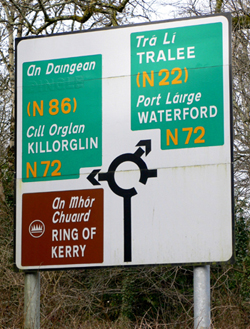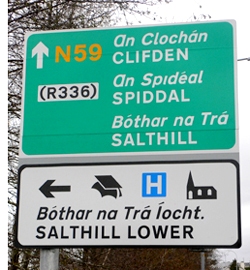 Almost everything we do centres on making our customers happy, and we pride ourselves on doing so. Recently, however, we have been getting feedback from more and more customers who are angry about something that is out of our control – road signs.
Almost everything we do centres on making our customers happy, and we pride ourselves on doing so. Recently, however, we have been getting feedback from more and more customers who are angry about something that is out of our control – road signs.
 A few months ago, just before the An Daingean/Dingle/Daingean Uí Chúis plebiscite to decide the town name, which I wrote about here, the government taped over the name “Dingle” on all road signs leading to the town. The name of the town is in limbo at the moment, but the road signs only point to “An Daingean.”
A few months ago, just before the An Daingean/Dingle/Daingean Uí Chúis plebiscite to decide the town name, which I wrote about here, the government taped over the name “Dingle” on all road signs leading to the town. The name of the town is in limbo at the moment, but the road signs only point to “An Daingean.”
Dingle is in the Gaeltacht (designated Irish speaking area), and road signs within the Gaeltacht are in Irish only (rightly so, in my opinion). However, when tourists arrive in Killarney, Tralee, or Farranfore, which are all outside the Gaeltacht, most of them are looking for the town of Dingle. They don’t know about An Daingean.
And so we listen to tales of woe from people who have wasted precious hours of their holiday driving around in circles, searching in vain for a town that is in guidebooks and on maps as “Dingle” but on the road signs as only “An Daingean.”
The Irish language is a valuable asset to the area in many ways, including tourism. Tourists will have exposure to the Irish language when they arrive in West Kerry, and it will enrich their experience. The purpose of road signs in Tralee, Farranfore and Killarney, however, should be that tourists do arrive and do so as quickly and easily as possible.
 What sense does it make to remove the Dingle name from signs outside of the Gaeltacht without any coordination with maps, guidebooks, GPS systems, etc.? We are dependent on tourism in West Kerry, and the signs are confusing many of the people we are trying to attract, making their first experience of the area a negative one.
What sense does it make to remove the Dingle name from signs outside of the Gaeltacht without any coordination with maps, guidebooks, GPS systems, etc.? We are dependent on tourism in West Kerry, and the signs are confusing many of the people we are trying to attract, making their first experience of the area a negative one.
Signs are bilingual elsewhere in the country outside of Gaeltacht areas (see photo right), and I cannot understand why the same can’t be true in Kerry, at least until there is agreement on the town name and full coordination with all relevant publications.
In the mean time, if you’re heading this way, make sure you have a good bi-lingual map – one that has the Irish names of towns in a legible font size. Better still, get a GPS. You’ll find “Dingle” listed on all of them.
Technorati tags: Dingle, An Daingean, sign, name, tourism, Kerry












Flann O’Brien would have a field day with this one . . . . I understand the basic facts surrounding this issue (have followed it from this side of the Atlantic), but I don’t understand the emotions. What’s driving the government’s intransience on an approach that is more reasonable? Immovable nature of the petty bureaucrats? Intransience on which Irish name is more correct? A meanspirited desire to ensure that the regions that get Gaeltacht funding “pay” for the benefits with a Gaeltacht that is 99.9 percent pure (as a soap commercial used to advertise)?
Well, I’ve lived in Dublin for 3 weeks now and I think it’s great that signs here are bilingual so that the few people that can’t understand English can find their way around. I don’t see why people who cannot understand Gaelic can’t have the same privilige in Kerry and elsewhere. Tzzz! Discrimination I say! 🙂
I do have mixed feelings about this issue, but will not go into it here. I do have a question for you, however. Do you, and your team, speak Irish? Do you conduct business through Irish? I am curious, as I have had some training in the language there in Ballyferriter, and it was interesting to me to talk to people about the impact of the English language on the daily lives of native Irish speakers. I kind of see both sides – the importance of keeping the language alive, and the problems it presents to the tourists who do not have the language, upon which the region depends economically. (And how I wish I could find someone here in NYC who has the Munster dialect, will ing to take on a student, so I could keep my studies up – no problems finding other dialects here, just Munster!)
Thanks for the comments! Sheila – I am a native New Yorker, but I have been taking Irish classes for the last few years. I also feel strongly about the Irish language remaining alive and well, especially in the Gaeltacht, and there are many challenges in that regard. This post is not meant in any way to be negative about the Irish language, but simply to make people aware of the road signs and the confusion they are causing.
We have always had Irish speakers on staff, use Irish as well as English on our packaging, etc. Most of our business is done outside of the Gaeltacht (the remainder is generally to tourists in our Dingle shop), so there is little business done through Irish.
I’m sure there must loads of people with Munster Irish in NY. I’ll keep an ear out…
Just a clarification, because I think my post was unclear: I also feel strongly about Irish, although I can understand and appreciate the various perspectives. Even over here in Virginia I’ve been working my way through an Irish language course on cassettes, just for fun. (Like some non-native speakers, I first got interested through my love of sean-nos singing.) But the government’s approach to carrying out the initiative is what has me stumped: taping out half of the bilingual road signs all over Ireland — only for Gaeltacht towns — as a way to keep the Gaeltacht alive, no less, just sounds like something from Jonathon Swift.
Thanks, Helen, and yes. We have three main sources of employment here. Farming is under threat and declining. Fishing is under threat and declining. Threaten tourism, and there might not be anyone left in these parts to keep the Irish language going!
Kieran, so sorry if my comment was taken in the wrong way – I did not read anything negative in the original post at all, and I do think it odd that the town names have been taped over. My response was just curiosity, since the subject of the language was raised, on whether in the stores in Gaeltacht areas you were using the language. I knew that you came from the US, and thought – wow – what a cool thing if they do speak Irish in their stores there! It would be a dream for me to be able to have a business there, and conduct it through Irish (and English, of course). And thanks for keeping an ear to the ground on NYC Munster dialect speakers – there are some that I know of in the outer-buroughs, and in Westchester, and other surrounding areas, but Manhattan – not yet!
Oh, and for Helen in VA – you know that you can listen to Raidió na Gaeltachta on RTE.ie, and even cooler, you can watch web TV of TG4 (TG4.ie) – which always helps with the language! Ros na Rún!
Kieran,
As you know we have just completed 10 days on the Dingle Peninsula and we have no Irish training. I would say that it took us a couple of days to start to know our way around the road signs. We were aware that the English place names would not be displayed before we came.
I’m sure that there will be problems for those non-Irish who are doing Dingle (Kerry) for just a day or two.
One of the things that I said more than once while we were there was that I wished that there was an Irish to English cheat sheet available. We were very interested in the historic sites listed on the Ord. maps and found that they were mostly in Irish.
None the less, we had the most wonderful 10 day vacation that we have ever had. Sorry that you and I did not meet up, but very much enjoyed our time with your brother and your Dad.
No worries, Sheila, and thanks for the RTE tip…
Thanks, Ron, and sorry to miss you, but I am delighted you had a great holiday. It’s a shame that you didn’t find our bi-lingual local map with a handy conversation guide! (We give them away free in the shop).
It’s like a Soviet photoshopping (didn’t there used to be more Politburo guys in that picture?)
I’ve been following the Dingle/Daingean debate for a bit, but I have to say I actually find those photos disturbing. There’s a contempt and arrogance at work there which makes me very unhappy.
And it’s quite obvious with whom it originates.
The Gaeltacht in Cork appears to be a law unto itself. Not only are signs outside this area displaying “Ballyvourney”, but the signs in the village itself are also Bi-lingual.
It should be one way or the other, not varying from gaeltacht to gaeltacht.
Just visited this site from the Irish Blog Awards site (congrats)
I’m not having a go or anything, and I fully understand the concerns you have, but I notice that on your company website you only seem to mention the name ‘Dingle’, on the various pages that mention the place (Store location, About us etc).
Having customers getting lost etc is not good for business (either for yourselves or other businesses), but maybe if everyone did their bit raising awareness of the name ‘change’, it would reduce any negative impact?